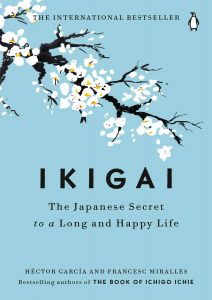
Key Takeaways:
1. Ikigai is a Japanese concept that translates to “a reason for being” or “a purpose in life.”
2. The book emphasizes the importance of finding one’s ikigai in order to live a long and happy life.
3. Ikigai is a combination of four elements: what you love, what you are good at, what the world needs, and what you can be paid for.
4. The book suggests that finding one’s ikigai requires self-reflection and a deep understanding of oneself.
5. Ikigai can be found in both personal and professional aspects of life, and it is important to find a balance between the two.
6. The book also discusses the concept of flow, where one is fully immersed and engaged in an activity, which can lead to a sense of fulfillment and happiness.
7. The authors also emphasize the importance of having a strong sense of community and social connections in finding one’s ikigai.
Practical Application:
1. The concept of ikigai can be applied in real-world scenarios by individuals seeking to find their purpose and passion in life.
2. In a professional setting, leaders and managers can use the concept of ikigai to help their team members find fulfillment and motivation in their work.
3. The book also suggests incorporating elements of ikigai into daily routines, such as finding time for activities that bring joy and fulfillment.
Valuable Insights for Leaders and Managers:
1. Chapter 3, “The Power of Purpose,” offers valuable insights for individuals in leadership or management roles. It discusses the importance of having a clear purpose and how it can motivate and inspire others.
2. Chapter 5, “The Flow of Life,” also offers valuable insights for leaders and managers, as it discusses the concept of flow and how it can lead to increased productivity and happiness in the workplace.
Effective Case Studies and Examples:
1. The book includes several case studies and examples of individuals who have found their ikigai and how it has positively impacted their lives.
2. One example is the story of a Japanese fisherman who continues to work well into his 90s because he loves his job and feels a sense of purpose in it.
3. Another example is the story of a woman who found her ikigai in volunteering and helping others, which brought her a sense of fulfillment and happiness.
Having a purpose is an essential ingredient of longevity and happiness. Okinawa, Japan’s secret to the longevity of life is ikigai. This Japanese term has two elements: ‘iki’ which means life, and ‘gai,’ or value. Discover your ikigai by asking these 4 basic questions:
1. What are your strengths? What is something you do better than everyone else?
2. What does the world need? Picture something you see that the world lacks.
3. What are your passions? Envision the things that you could do the entire day without ceasing.
4. What can you earn a living doing? You ought to make money from your craft, so how can you achieve that?
Ikigai doesn’t need to be associated with your work. Your purpose may arise from a hobby or your social relationships. Do whatever you discover that gets you up in the morning, and make sure to never give it up.
Leave a Reply